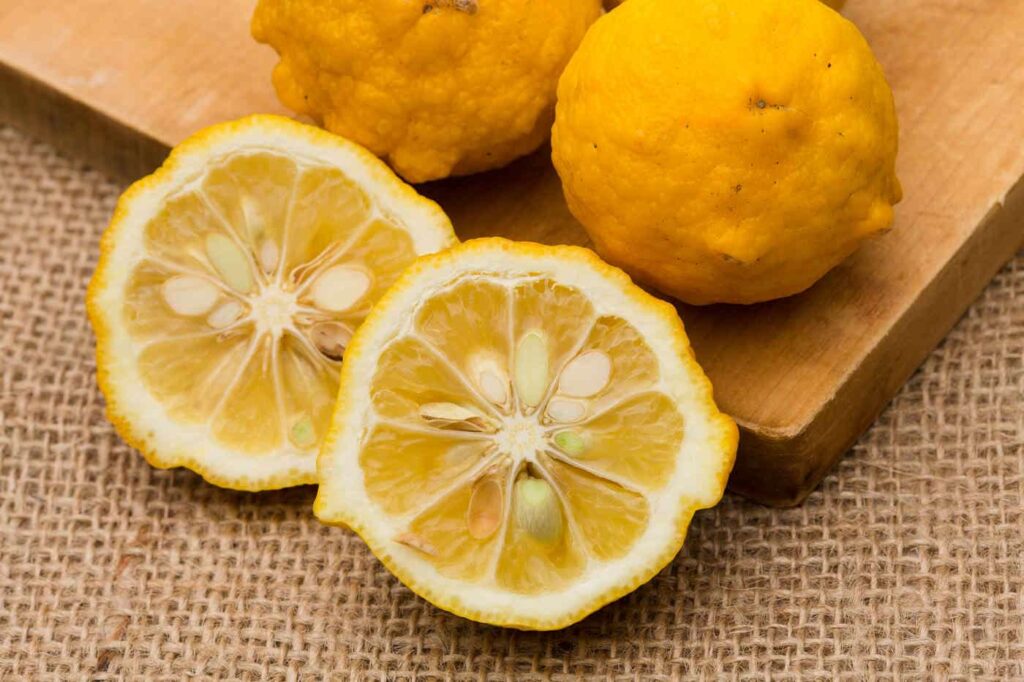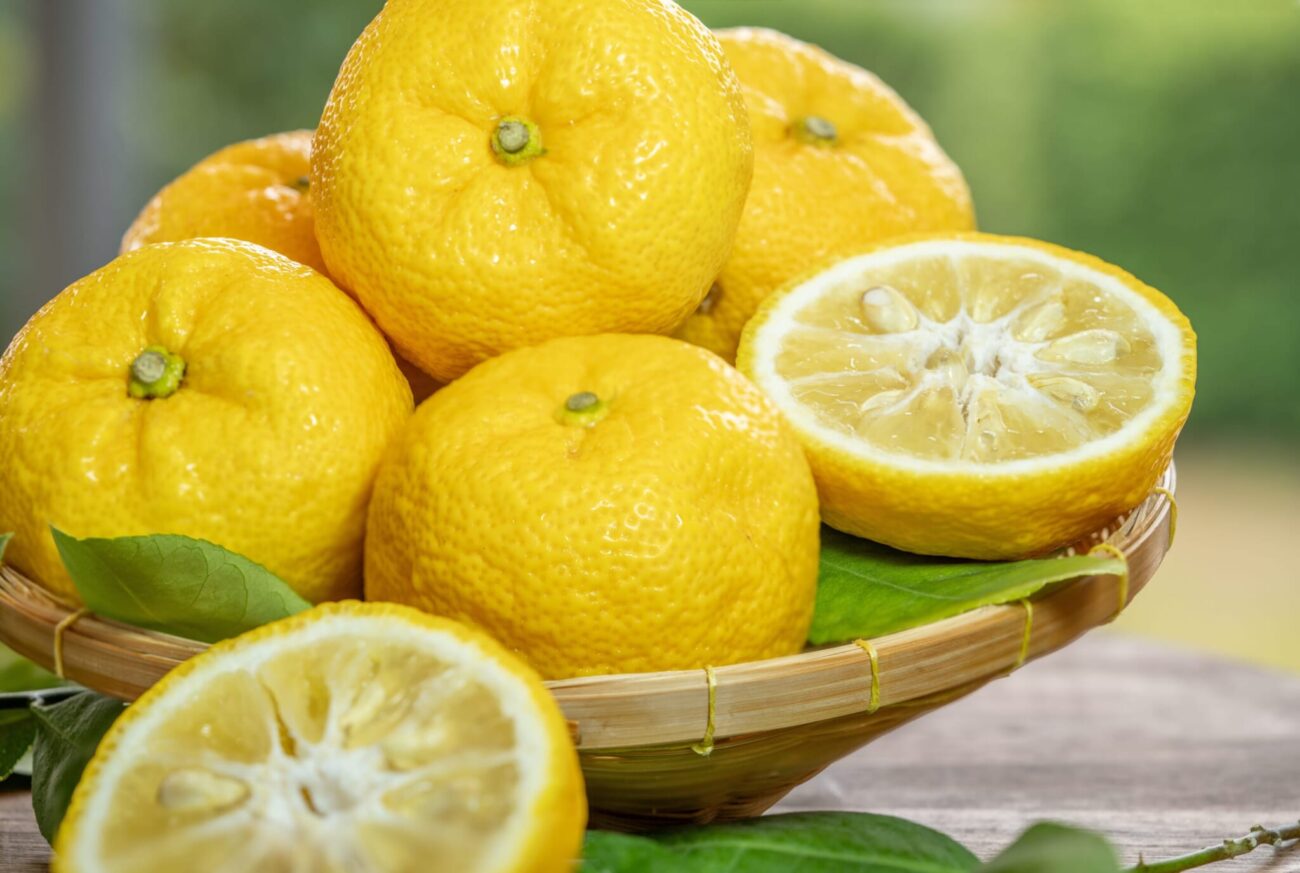Fragrant, zesty, and full of health-boosting compounds, Yuzu (Citrus junos) is more than just an exotic fruit—it’s a superfruit with centuries of use in East Asian cuisine and wellness practices. Native to China and widely cultivated in Japan and Korea, Yuzu is a citrus hybrid known for its aromatic zest, tart juice, and therapeutic properties.
In this article, we’ll explore the health benefits, recommended uses, and potential contraindications of this unique fruit.
🌟 What Is Yuzu?
Yuzu is a small, round citrus fruit that looks like a cross between a lemon and a mandarin orange. It has a thick, uneven rind, a strong floral fragrance, and a tangy flavor somewhere between lime, grapefruit, and tangerine.
Unlike other citrus fruits, Yuzu is rarely eaten fresh due to its sourness and seeds. Instead, its juice, zest, and peel are commonly used in:
- Marinades and sauces
- Beverages (like yuzu tea or cocktails)
- Desserts and candies
- Aromatherapy and bath products
🍋 Health Benefits of Yuzu
1. Rich in Antioxidants
Yuzu contains high levels of vitamin C, flavonoids, and limonoids, which help fight oxidative stress and reduce inflammation. These compounds support immunity, skin health, and may help lower the risk of chronic diseases.
2. Supports Immune Function
Thanks to its vitamin C content, Yuzu may help protect against infections, speed up recovery from colds and flu, and boost general immune resilience.
3. Promotes Skin Health
Yuzu extract is commonly used in skincare products for its anti-aging and brightening effects. Vitamin C helps stimulate collagen production, reduce pigmentation, and improve skin texture.
4. Improves Mood and Reduces Stress
Yuzu’s scent has been shown in aromatherapy studies to reduce anxiety and lower cortisol levels. Inhaling yuzu essential oil or enjoying a warm yuzu-scented bath may promote relaxation and enhance mood.
5. Supports Circulation and Heart Health
Some studies suggest yuzu compounds may improve blood flow, reduce arterial stiffness, and have a mild blood pressure-lowering effect, contributing to better cardiovascular health.
6. Aids Digestion
Yuzu peel contains pectin and dietary fiber, which may support healthy digestion and help relieve mild constipation or bloating.
🫖 Recommendations: How to Use Yuzu
✅ In Food and Drink
- Yuzu tea (Yujacha): A popular Korean remedy made from yuzu marmalade and hot water.
- Dressings and sauces: Adds zest to soy-based marinades, ponzu sauce, and salad dressings.
- Cocktails and mocktails: A fragrant alternative to lemon or lime juice.
- Desserts: Enhances the flavor of cakes, jams, and candies.
✅ In Skincare
- Look for yuzu extract or essential oil in moisturizers, serums, or masks for brightening and anti-aging benefits.
✅ In Aromatherapy and Bathing
- Add a few drops of yuzu essential oil to a diffuser or bathwater for a calming, spa-like experience.
- Traditional Japanese yuzu baths (yuzuyu) are taken during winter solstice to ward off colds and promote circulation.
⚠️ Contraindications and Precautions
While Yuzu is generally safe for most people, consider the following precautions:
❌ Citrus Allergies
Individuals with allergies to citrus fruits may react to yuzu. Reactions could include skin rashes, itching, or digestive discomfort.
❌ Photosensitivity
Yuzu essential oil, like other citrus oils, may cause photosensitivity. Avoid applying it to skin before sun exposure to prevent irritation or pigmentation.
❌ Medication Interactions
Citrus compounds may interfere with certain medications (similar to grapefruit), though research on yuzu-specific interactions is limited. Consult a healthcare provider if you’re taking:
- Statins
- Calcium channel blockers
- Immunosuppressants
❌ Pregnancy and Breastfeeding
Yuzu in food amounts is generally safe, but essential oil use should be approached with caution during pregnancy and breastfeeding. Always consult a healthcare provider before use.

Yuzu is a shining example of how flavor and wellness can go hand in hand. With its immune-boosting vitamin C, stress-relieving scent, and culinary versatility, yuzu is a great addition to your kitchen, bathroom, or wellness routine.
Whether you’re sipping yuzu tea on a cold morning, adding a burst of citrus to your dinner, or unwinding in a fragrant bath, this citrus gem offers a sensory and therapeutic treat that’s hard to match.
Have you tried yuzu in your recipes or skincare?
Share your favorite uses and experiences in the comments below!

